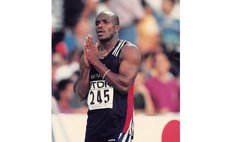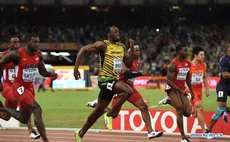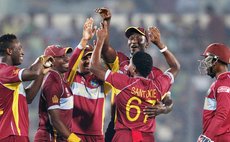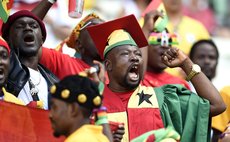Faltering fortitude
Two rather early portents arrived nearer the beginning of the second Test match against England and may have served to provide a clearer look at the West Indies hope of revival in international cricket. The first of these had to do with the dismissal of Devon Smith. West Indies lost the toss and were sent in by England. Immediately Kraigg Brathwaite fell victim to a magnificent delivery as Jimmy Anderson's prodigious swing defeated him with the score only on two. It was a ball which could have had the measure of any batsman whatever. Every concern then centred on survival to keep the opposition at bay, bearing in mind the importance of restraining the Englishmen spearheaded by Anderson's lift, having previously elevated to the position as his country's premier wicket taker.
All seemed to be going well enough as Smith and Darren Bravo were proceeding to build a rearguard response. Then, incredibly it happened. An appeal for a catch jolted the umpire into raising his hand as Smith's bat made contact with the ground – the official conjecturing that contact also to have included the ball as well. The batsman showed an instinctive hesitation and then walked to the pavilion with the score reading 38 for two, and perhaps an ill omen. The Grenadian in his battle with his cricketing vicissitudes, having just made up for early failure at Antigua by crafting a belligerent half century to pave the way for the hard earned draw, absolutely needed to seek reprieve from his run of ill fortune by resorting to the mercies of a review of the hasty umpiring verdict. He did not ask for it, nor did his partner!
And this I found abysmal in the extreme! At the level of Test cricket, right at the opening stanzas, at very least there ought to be a sharpened focus of attention by the two batsmen. Safely one can bet one's bottom dollar there would immediately have been a review by Australians, South Africans, Indians or Englishmen in a similar situation – whose ostensible premise shapes along the old person's adage: "blind men don't play games". Might have been premature to tell, but this element of self denial may have contributed to the inane poverty of the West Indies first innings score of 299. All this in light of video replays indicating Smith had missed the ball by a clear inch and a half.
Amid a mixture of eventual bad light and poor batting West Indies ended the day on 188 for 5, and some worrisome concern that the youngster Jermaine Blackwood may still be under hangover of his maiden Test century at the Sir Vivian Richards stadium. Through it all, Marlon Samuels remained at the close on 94, excellent evidence of a composure spiced with a declared ability to take fullest charge of the England bowling. It was not effusively ornate. However, his effort suggested willingness to embrace fullest responsibility as demanded by the fullness of a five day encounter.
If ever there was need for complete resolve by Samuel, it had to be at the resumption on the second morning. He ought to have constrained himself to eye the team position and refrain from abdicating at the advent of his personal achievement of three figures. His dismissal for 103 reflected a woeful lack of required ultimate ambition! England proceeded to emphasize the extent of our stupidity by displaying a professional approach to making full use of batting on a decent surface.
England worked their way to 464 with Root 182 not out, Trott 59, Cook 76, Ballance 77, and the scoring might have soared to greater volume if Davindra Bishoo's quality of leg spin had not exerted a curbing effect. Ironically, he reaped four for 177, figures which might have been enhanced by the presence of more potent bowling resources to partner him. Absence of Taylor with a shoulder injury grossly impaired the cutting edge of the pace attack and underlined long standing doubts about West Indies' ability to bowl out decent sides twice in a match.
Bishoo was overbowled to an extent causing harm to his slight physique and availing the England batsmen of a bonus of fuller familiarity with his methods. Had he been adequately supported in carrying the West Indies burden, it is odds on England might have been restricted to well under 400. Whether the interval of five days before the third and final Test in Barbados allows sufficient recovery time for his spinning finger is open to conjecture. Yet, I would rate him well above Suleiman Benn as an effective slow bowler, and it amazes that the latter could ever have been preferred for the first Test and even for the World Cup in Australia-New Zealand.
On all three counts of bowling, batting and fielding, I rate Bishoo miles above Benn who seemed a complete liability in fitness as well. On this latter the West Indies assume a deplorable deficit. Physically we have difficulty batting well for a sufficient number of sessions or innings or matches. The same applies to our bowling.
Coping with England's lead of 165 was hindered by softness of West Indies mindset. Having started the fifth day at 202 for two – a position that could have been appreciably bettered if Bravo had not inexplicably edged to Butler behind the stumps for 69 just when he looked good for a double century – a projected 400 to 500 ought to have been routine.
Advent of the new ball removed Brathwaite on 116 to make it 224 for 3 and a mere five runs added. From then on it was the familiar procession. Chanderpaul, not having his best season, going for 7 and 238 for 4, Samuels 37 at 239 for 5, Blackwood 10 at 257 for 6, Holder run out for 2 at 260 for 7, Roach 10 at 282 for 8, Ramdin 28 at 307 for 9 and lastly Shannon Gabriel 0 to round off at 307. All remaining eight wickets fell for 105 runs added on the final day. Anderson helped himself to 4 for 43, two catches and surprised Holder run out with a direct hit.
The challenge of getting 143 in a possible 59 overs did not faze England, and Cook 50 not out and Gary Ballance 81 not out romped home for victory by 9 wickets, proving the visitors to be of far greater merit in both physical and mental fortitude. Five of the last West Indies wickets were softly surrendered revealing a strong deficiency in ability to sustain desired resolve. Building of character remains job number one for Phil Simmons and Sir Curtley Ambrose. The cornerstone has to be physical fitness, without which the mental strength continues to elude.




